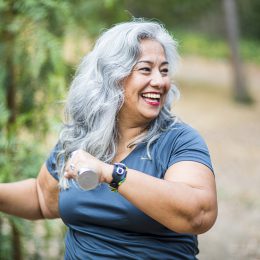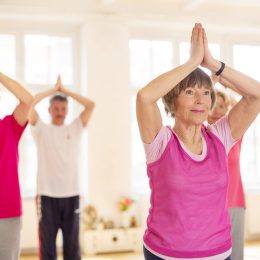6 Ways to Be Healthier in 60 Seconds or Less
These little things can help prevent falls, improve memory, and promote sleep.

You already know the big things you should be doing to improve your health: exercise regularly, prepare healthy meals, sleep at least seven hours a day. But you don’t have to overhaul your life to see healthy gains. In fact, you can be healthier 60 seconds from now. Try these simple tips to help prevent falls, improve memory, promote sleep, and more.
1. Drink a Glass of Juice
Polyphenols, which are naturally occurring compounds found in fruit and vegetable juices, are thought to be powerful antioxidants. In one study, researchers compared the records of nearly 2,000 people whose health was tracked for eight to 10 years. They found that those who consumed three or more servings of juice per week had a 76 percent lower rate of developing Alzheimer’s disease than those who drank juice less than once per week.
Just be sure to read labels and stick to 100 percent fruit juice. Many juices contain added sugars, which can increase your risk of cardiovascular disease and unhealthy weight gain.
2. Roll Your Ankles
Improving ankle mobility is an easy way to boost balance and reduce your risk of falling. Stiff ankles are a problem for two big reasons. First, your ankles must be able to move while you’re walking on unstable ground. If you walk over a crack in the sidewalk and your ankle is stiff or locked, it may cause you to tilt to one side and fall. Second, ankles are constantly giving feedback to the brain about how you’re walking and what muscles to switch on, like those in your hips and thighs. The more your ankle moves, the more information it gives.
Simply rolling your ankles is a great way to increase mobility. Roll both ankles in a full circle as far you can for 15 to 20 seconds, then switch and go the other direction for another 15 to 20 seconds. Next, stand and practice going up onto your toes and down again for 20 to 30 seconds. If you’re unsteady, hold onto a chair or the wall to make it easier.
3. Watch a Funny Video
Visit YouTube, and type in “funny cat videos.” (We’ll wait…) Humor and laughter can improve short-term memory, research suggests. In a study published in Advances in Mind/Body Medicine, older adults who watched a funny video before a learning ability test had significant improvements in short-term memory compared to those who just sat silently.
Bonus: Laughter may also help improve your immunity and strengthen your social bonds.
4. Eat an Orange
There may not be a fountain of youth, but the foods you eat may come pretty close. When researchers analyzed the diets of 4,025 women between the ages of 40 and 74, they found those whose diet was rich in vitamin C had fewer wrinkles than those less inclined to snack on citrus.
Not a fan of oranges? Get your daily recommended dose of 75 mg of vitamin C with these foods: fresh strawberries (89 mg per cup), Brussels sprouts (71 mg per cup), raw broccoli (81 mg per cup), or sliced mango (60 mg per cup).
Subscribe to our newsletter
It's quick and easy. You could be one of the 13 million people who are eligible.
Already a member? Click to discover our 15,000+ participating locations.
Follow Us
5. Recall a Happy Memory
Nostalgia isn’t all bad. Research has found that reflecting on your past can improve your self-esteem and outlook on the future. And recalling happy memories might help alleviate symptoms of depression, according to a 2015 Massachusetts Institute of Technology study. So go ahead and take a walk down memory lane!
Got more time? Make plans to get together with your adult children so you can share some great stories from your past. You’ll boost your mood and pass on important family history at the same time.
6. Open Your Blinds
The light you’re exposed to today could affect how you sleep tonight. People exposed to sunlight or bright indoor light during the morning hours get better quality sleep and are less likely to feel stressed than those who don’t, according to a recent study. So head over to the window to soak up some sunlight shortly after you wake up.
If it doesn’t help, check for these five sneaky reasons you can’t sleep.





